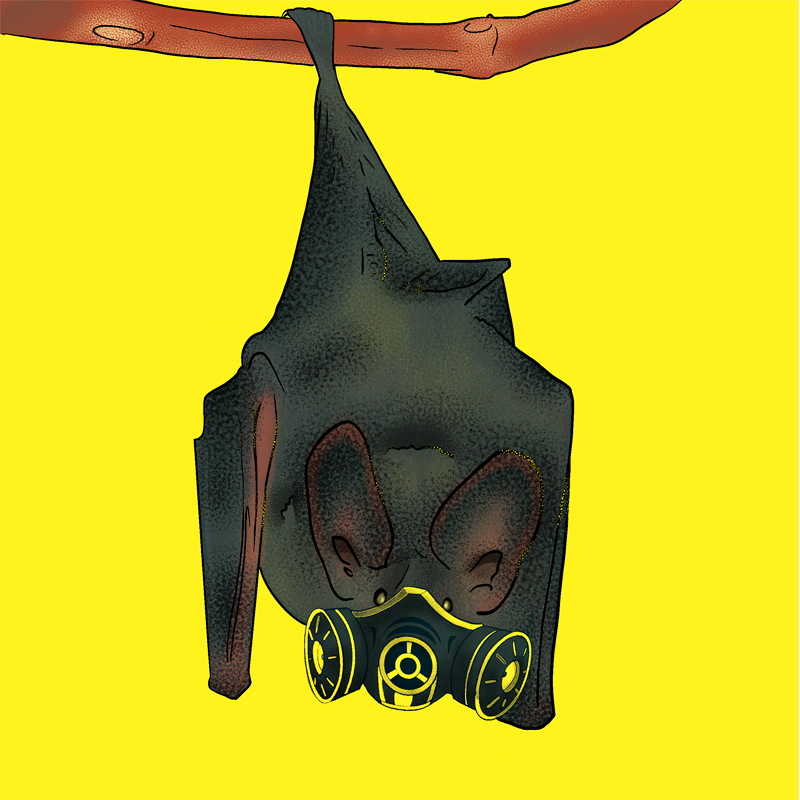
Daria put the mask on the window sill, tied up her purple hair and closed the window.
Suddenly Rudy crossed the door: he was out of breath, more than usual, after climbing all the stairs.
He had walked down to the Sri Lankan grocery right beyond the square to grab a few things and, on the way, he had taken a chance to observe the roofs all around. He had been thinking about placing an aerial to set up a radio there, but then an imperial army patrol started chasing him. He sought shelter in a doorway for more than an hour, fearing some resident-spy would report or film him with a smartphone.
«Fuck it, this feels like a video game», I think to myself.
«We were worried about you, Rudy» says Maz, scratching his scaly arm with his fingernails. For the first time today he takes his eyes off the screen.
Let’s agree we are a gang, but everyone is free to do whatever they want. He cares about this aerial, I support him. We have collected some stuff but we aren’t sure enough about the best way to send it around. He’s just trying to get us out of this situation.
Daria reads what I wrote this morning, but she doesn’t seem convinced; she stands up without a word, takes the mask and goes to the window sill to look outside. Maybe she sees things we can’t see, or she’s just anxious about Rudy not coming back.
The silence in the room only is broken by the irregular breath of Rudy, who’s trying to recover and by Maz, tapping on his keyboard.
«Read me what you wrote» – he says, standing up from the desk and wearing the mask – «but read slowly or I can’t make it out what you say»
I show him my middle finger and light a cigarette.
Back in the days, to describe an event over which we had no control or responsibility, we would have used the concept of “atmospheric phenomenon”. The acceleration of climate change in the last few years and all the consequences related to human action require us to rethink this expression.
In the same way, we believe it is very difficult to lay the blame for the propagation of the CoVID-19 epidemy on strictly “natural” elements.
In light of what we currently know, this human self-absolution is completely inappropriate, since the pandemic is the result of the aforementioned exploitation of the planet.
Collective considerations on what gravitates around us have not been easy. Our gang had to wear masks and wander among conspiracies about the birth and spread of the virus (of which, by the way, we could have reported a hilarious anthology, if there weren’t thousands of deaths involved), confusing news spread collective paranoia and the only consolation was their digital nature, which, at least, avoids further, unnecessary waste of paper and ink.
While WHO identified the new disease as CoVID-19, the International Commission for Virus Taxonomy named the virus SARS-CoV-2. The virus is in fact very similar to SARS, but two characteristics: it is more contagious and has luckily, a lower mortality rate. This distinction is required as the disease is often mentioned and confused with the virus. This premise also explains why we are now part of the debate on SARS-CoV-2 from which we had kept away. The debate about this virus-disease seems to make impossible to reason about everything sorrounding the epidemic, such as prison riots or wildcat strikes in factories and warehouses: the watchwords remain “Stay at home”.
CoVID-19 came to humans through animals, like many other diseases of the last decades: they are therefore called zoonoses. Viruses can survive inside animals for decades without causing their death. The history of zoonosis begins when the virus seizes the opportunity to infect a new species: this event is called “spillover”.
Rabies, leptospirosis, anthrax, SARS, MERS, yellow fever, dengue, HIV, Ebola, Chikungunya, Coronaviruses and the most common flu, just to name a few. By simply reading the above examlples we realize they all are familiar. The reason is simple: they all are zoonosis. More than 70% of those diseases who have been affecting humanity in the last 30 years came actually from animals and it is expected to get worse. In 2018 WHO gave warning about a probable zoonotic pandemic. Neverthenless, Italian governments (and all Parties) kept on dismantling our public health-care system instead of strengthening it to face a new upcoming emergency.
But that being said, then we could ask: if all these desease come from animals, what kind of responsibility does the human being have? To reply, we need a clarification. We can’t give the whole responsibility to human beings: we need to talk about the production system, which helps developing the conditions to let virus spread from a species to another.
Here the conditions.
The main reason of the progressive spread of zoonotic disease is, in fact, the destruction of the planet.
Deforestation and urbanisation are reducing the habitat of animal species which are virus carriers and oblige them to have contacts with people. In the same way the ecosystem perturbation, which allows the disappearance of entire species, “forces” the virus to find a new body to live in, and humanity, with his 7,7 billion of on the planet, is for sure an easy target.
Changes in the soil and destruction of natural environment are held responsible, at least, of half the emerging zoonoses.
The uncontrolled urbanization of forested areas has been associated to virus transmitted by mosquitoes, but not only. It is believed that millions of species, unknown to science, are living in tropical forests. Between these millions of unknown species there are viruses, bacteria, fungus and many others organisms, many of which are parasites. Ebola, Marburg, Lassa, Monkeypox and the forerunner of HIV are a tiny sample of the myriad of viruses which are not discovered yet. Also melting glaciers will bring back old bacteria and viruses we are not vaccinated against.
The latest analysis show that virus SARS-CoV-2 has mutated into two strains, dubbed ‘L’ and ‘S’ types. We don’t know where the origin of the older ‘S-type’ lays, while the latter‘L-type’ , spread in the sadly famous animal market in Wuhan. Markets are becoming the main places where the spread of infections and spillover start, and mostly those markets where exotic animal meat is sold, considered as luxury good and symbol of social status. Although this is absolutely true, let’s not forget that some disease, which infected men in the recent past, such as Swine Flu and Avian Flu, started from intensive breeding. In the same way, the massive use of drugs in intensive breeding of livestock brought to salmonella’s strains. In general, intensive zootechnical practices can facilitate pathogen to “spill–over“, leading to new and dangerous zoonoses, like SARS and new strains of flu.
Therefore, when the emergency will be resized and the grip on peddlers and markets will be loosened, by placing side by side “social decorum” and “health”, by using them in a threatening way, please remember that the most of the meat we eat comes directly from those intensive breeding systems.
In summary: deforestation, global warming, extinction of tens of thousands species, melting glaciers, ocean pollution, intensive exploitation of animals and soil are all causes of the spread of viruses from animals to men. These short and simple examples show the clear urgency of a route change to avoid what scientists called “Big One“: an epidemic of unimaginable proportions, only comparable to the Black Death, that during the Middle Ages, reduced European population by one third.
The urgency of this route change is even more obvious if we consider what IPBES (Intergovernamental Science-Policy Platform on Biodiversity and Ecosystem Services of ONU) says. IPBES report uses the word “unprecedent” to explain the destructive action of human being on the nature. According to the report, the 75% of the soil and the 66% of the marine environment have been modified in a severe way and, as never before in the history of humanity, about one million of animal and plant species are at risk of extinction.
As we said in the premises – Maz suggested me to add this part – everything is happening because of someone who is the brutally exploiting the planet and all his inhabitants. It is quite evident, in fact, that the production system we live in, takes possession of human beings and earth, with the same brutal arbitrariness, without worrying about the survival of either of them.
We need to stop thinking that the catastrophe, the destruction of the planet, will suddenly happen on a fateful day X. The catastrophe is already before our eyes. Climate changes, extinctions and pandemics represent our reality. The catastrophe is in progress.
Now we have no other choice: to put an end to capitalism or put an end to humanity.
Everyone remains silent, no comment. Daria seems absorbed in other thoughts.
«So?» I ask after a while.
Rudy answers first:
«It’s ok for me. Maybe too long for a radio program». His scaly arm reflects the iridescent shades of the sunset infiltrating through the window.
«But who said we have to read it on the radio? I mean, when was it decided?»
«Forget it. We’ll think about it tomorrow. It takes a little longer for the Game Over».
He drops onto the couch, takes the remote control and turns on the TV. The same program, on all channels.
Share this post:
